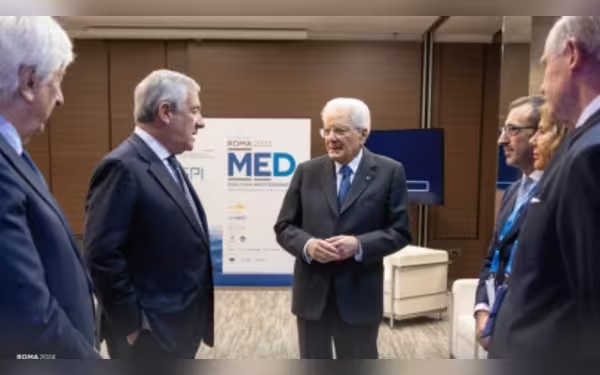Wednesday, January 15, 2025 03:41 PM
Leaders Address Middle East Challenges at Rome MED Dialogues 2024
- International leaders discuss Gaza and Lebanon conflicts.
- Egypt to host humanitarian conference on December 2.
- Emphasis on economic partnerships and migration solutions.
 Image Credits: thepeninsulaqatar
Image Credits: thepeninsulaqatarLeaders convene at Rome MED Dialogues 2024 to address Middle East conflicts and humanitarian needs, emphasizing cooperation and economic partnerships.
In a world where geopolitical tensions often dominate headlines, the Mediterranean region stands as a focal point for discussions on peace, security, and cooperation. The 10th edition of the Rome MED – Mediterranean Dialogues 2024 commenced in Fiuggi, Italy, bringing together leaders and diplomats from various nations to address pressing issues affecting the Middle East. This annual event, organized by the Italian Ministry of Foreign Affairs and International Cooperation in collaboration with the Italian Institute for International Political Studies (ISPI), aims to foster innovative solutions and redefine traditional perspectives on Mediterranean affairs.
The conference opened with notable figures in attendance, including the President of the Italian Republic, H.E. Sergio Mattarella, and the Italian Deputy Prime Minister and Minister of Foreign Affairs, H.E. Antonio Tajani. The gathering featured over 2000 delegates and more than 200 speakers, highlighting the significance of the discussions taking place. During the opening session, various leaders, including foreign ministers from Arab and non-Arab countries, shared their insights on the current challenges facing the region.
One of the key topics addressed was the ongoing conflict in Gaza and Lebanon. Antonio Tajani emphasized the need for the international community to work together to restore peace and security. He stated, "Italy is working with partners to achieve a ceasefire in Gaza, to ensure food supply as part of the solidarity campaign aimed at bringing food to Gaza." This statement underscores Italy's commitment to humanitarian efforts and the importance of collaboration in addressing the crisis.
Egyptian Foreign Minister Badr Abdelatty also spoke about the critical situation in the Mediterranean, highlighting the urgent need for an immediate ceasefire in Gaza and Lebanon. He stressed the necessity of humanitarian aid and the importance of finding a political solution to the ongoing conflicts. Abdelatty noted that Cairo will host a "Call for Action" conference on December 2, aimed at strengthening the humanitarian response in Gaza, showcasing Egypt's proactive approach to regional challenges.
Furthermore, the discussions touched upon the economic potential of the Mediterranean region. Leaders emphasized the importance of real partnerships among Mediterranean countries to achieve mutual interests. The unresolved issue of migration was also a significant point of discussion, with a focus on Egypt's commitment to combating illegal migration through comprehensive approaches that address root causes.
As the conference progressed, the Minister of State for International Cooperation of the United Arab Emirates, Reem Ebrahim Al Hashimy, highlighted the urgent need for humanitarian efforts and conflict resolution. She pointed out the disproportionate impact of conflicts on civilians, particularly vulnerable groups such as the elderly and women. Al Hashimy's remarks serve as a reminder of the human cost of conflict and the necessity for immediate actions, including ceasefires and the facilitation of humanitarian aid.
The Rome MED – Mediterranean Dialogues 2024 serves as a vital platform for leaders to come together and address the multifaceted challenges facing the Middle East. The discussions not only focus on immediate humanitarian needs but also aim to foster long-term solutions for peace and stability in the region. As the world watches, the outcomes of this conference could pave the way for a more collaborative and peaceful Mediterranean, ultimately benefiting future generations. The commitment to dialogue and cooperation is essential in navigating the complexities of international relations and ensuring a brighter future for all.













